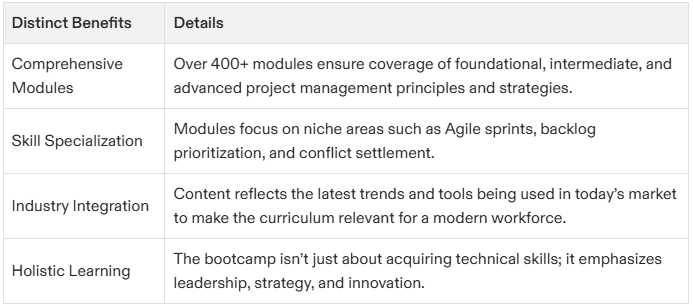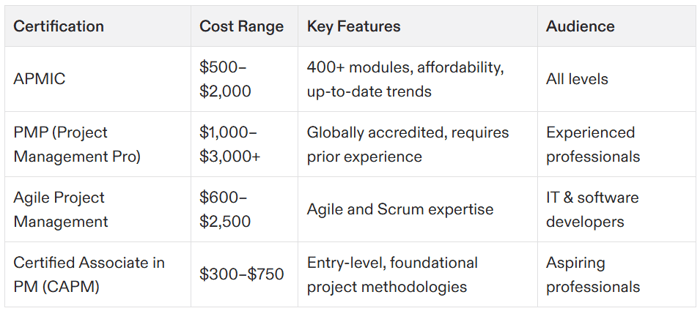Table of Contents
- Why Project Management Certification Books Are Important
- Top Project Management Certification Books
- How to Choose the Right Certification Books
- Tips for Making the Most of Certification Books
- APMIC Certification: A Comprehensive Overview
- Less Commonly Known Facts About Project Management Books
- Conclusion
-
- FAQs
Imagine you're the conductor of a grand symphony, but instead of music, you're orchestrating projects. Project management is the unsung hero behind every successful organization, and to truly shine in this role, you need more than just experience—you need the right tools and certifications. That's where project management certification books come in, your secret sauce to mastering the art of project management. Let's dive into the top project management certification books that will catapult your career to new heights!

Why Project Management Certification Books Are Important
In today's fast-paced business world, project management certifications are no longer just a nice-to-have; they're a must-have. Whether you're an aspiring project manager or a seasoned pro, certifications like PMP (Project Management Professional) or PRINCE2 can significantly boost your career prospects and earning potential. These certifications aren't just about passing an exam; they're about understanding methodologies, frameworks, and real-world applications that help you manage projects with higher success rates.
If you're exploring career opportunities that come with project management certification, check out this comprehensive guide on jobs with project management certification.
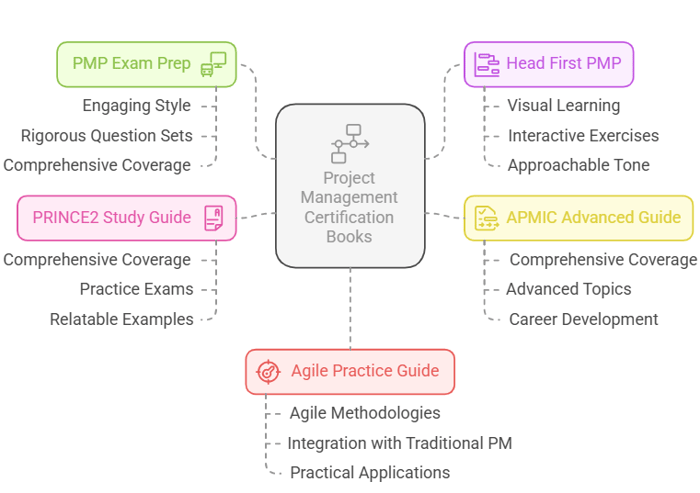
Top Project Management Certification Books
Project management certification books are invaluable resources for anyone preparing for certifications like PMP, PRINCE2, or APMIC. These books not only help you pass the exams but also equip you with practical skills and knowledge that are essential for managing projects effectively. Here are some of the top project management certification books that can help you boost your career:
PMP Exam Prep by Rita Mulcahy
Overview: This book is a must-have for anyone preparing for the PMP exam. It is renowned for its engaging style and rigorous question sets, making it a staple for PMP aspirants. Rita Mulcahy's approach simplifies complex project management concepts, ensuring that you grasp the material thoroughly.
Key Features:
Engaging Style: The book uses an engaging narrative that keeps readers interested and motivated throughout their study journey.
Rigorous Question Sets: It includes a comprehensive set of practice questions that simulate the actual PMP exam, helping you gauge your preparation level.
Comprehensive Coverage: Covers all aspects of project management as outlined in the PMBOK Guide, ensuring you're well-prepared for the exam.
Head First PMP by Jennifer Greene and Andrew Stellman
Overview: If you prefer a more interactive and visual learning experience, "Head First PMP" is the perfect choice. This book uses a fun tone and incorporates visuals and exercises to break down complex concepts into digestible sections, making information stick better.
Key Features:
Visual Learning: Utilizes images, diagrams, and illustrations to explain project management concepts, which is particularly helpful for visual learners.
Interactive Exercises: Includes exercises and quizzes that make learning more engaging and interactive.
Approachable Tone: The book's fun and approachable tone makes it easier for beginners to grasp project management principles.
APMIC Advanced Guide to Project Excellence
Overview: This comprehensive guide is designed for those aiming to achieve the APMIC certification. It covers everything from the basics of project management to advanced analytics and change management, making it an ideal resource for career development in project management.
Key Features:
Comprehensive Coverage: Covers over 400 modules, providing a deep dive into various aspects of project management.
Advanced Topics: Includes advanced analytics, AI tools, and change management, preparing you for real-world challenges.
Career Development: Acts as a complete manual for career advancement, focusing on both theoretical knowledge and practical applications.
PRINCE2 Study Guide by David Hinde
Overview: For individuals preparing for the PRINCE2 certification, this study guide is highly recommended. It is well-structured and comprehensive, featuring practice exams and relatable examples that help reinforce your understanding of PRINCE2 methodologies.
Key Features:
Comprehensive Coverage: Covers all aspects of the PRINCE2 framework, ensuring you're well-prepared for both the Foundation and Practitioner exams.
Practice Exams: Includes practice exams that simulate the actual PRINCE2 exams, helping you assess your readiness.
Relatable Examples: Uses real-world examples to illustrate how PRINCE2 principles can be applied in practical scenarios.
Agile Practice Guide by PMI
Overview: This guide is essential for anyone exploring agile methodologies. It bridges traditional project management concepts with the fast-paced, iterative process of Agile, providing insights into how to integrate agile practices into your project management toolkit.
Key Features:
Agile Methodologies: Offers a deep dive into agile frameworks such as Scrum and Kanban, explaining how they can be applied in real-world projects.
Integration with Traditional PM: Helps you understand how to blend agile practices with traditional project management methodologies.
Practical Applications: Provides case studies and examples that illustrate the practical application of agile principles in various project environments.
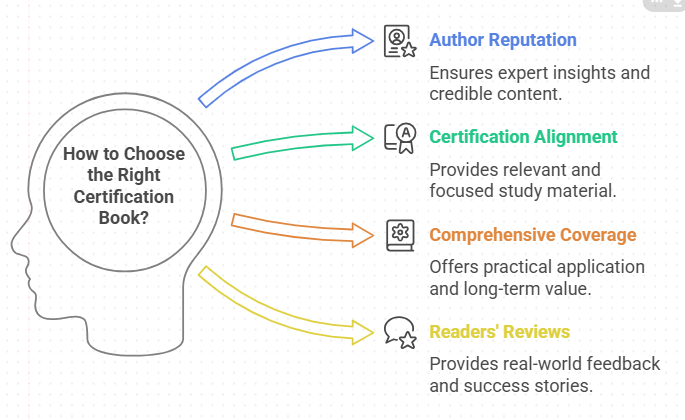
How to Choose the Right Certification Books
Choosing the right certification books is a crucial step in your journey to becoming a certified project manager. With so many options available, it can be overwhelming to decide which books will best support your goals. If you're looking for guidance on selecting the most recognized certifications, check out this resource on the top project management certifications.
Reputation of the Author
When choosing a certification book, the reputation of the author is paramount. Opt for books written by industry experts or exam prep instructors who have a proven track record of helping candidates pass their exams. These authors typically have extensive experience in project management and are well-versed in the latest methodologies and best practices.
Why Author Reputation Matters:
Expert Insights: Industry experts provide insights that are grounded in real-world experience, making the content more relevant and applicable.
Exam Prep Expertise: Instructors who specialize in exam prep understand the exam format and content, ensuring that the book covers all necessary topics.
Credibility: Books by renowned authors are often more credible and trusted by readers, which can enhance your learning experience.
Certification Alignment
Ensure that the book aligns with your desired certification. For example, if you're preparing for the PMP exam, choose books that specifically focus on PMP exam prep. Similarly, for PRINCE2 or APMIC certifications, select books that cover the respective methodologies and exam content.
Why Certification Alignment Is Important:
Relevance: A book that aligns with your certification will cover the exact topics and concepts you need to know, making your study more focused.
Efficiency: By studying material that is directly relevant to your exam, you can prepare more efficiently and effectively.
Confidence: Knowing that your study material is aligned with the exam content can boost your confidence as you prepare.
Comprehensive Coverage
Look for books that provide insights into practical applications beyond just exam prep. While passing the exam is important, understanding how to apply project management principles in real-world scenarios is equally crucial. A comprehensive book should cover both theoretical knowledge and practical applications.
Why Comprehensive Coverage Matters:
Beyond Exam Prep: A book that focuses solely on exam questions might not prepare you for the challenges you'll face in real projects.
Practical Skills: By learning how to apply project management concepts in practical scenarios, you'll develop skills that are valuable beyond the exam.
Long-Term Value: A comprehensive book provides long-term value, serving as a reference guide even after you've passed your exam.
Readers’ Reviews
Always check for readers' reviews to gauge the effectiveness and user feedback of a book. Reviews can provide valuable insights into how well a book has helped others prepare for their exams and whether it meets your learning needs.
Why Readers’ Reviews Are Important:
Real-World Feedback: Reviews from other learners can give you a realistic view of how useful a book is in preparing for the exam.
Identifying Weaknesses: Reviews might highlight any weaknesses or areas where the book could improve, helping you make a more informed decision.
Success Stories: Positive reviews can motivate you and provide confidence in your choice of study material.
Tips for Making the Most of Certification Books
Set a Study Schedule: Consistency is key; devote specific hours to reading and solving practice sections.
Create Summaries: Jot down key concepts in your own words to internalize information better.
Test Yourself Often: Use mock exams to replicate real conditions and identify weak spots.
Join Study Groups: Collaborate with peers for diverse insights and motivation.
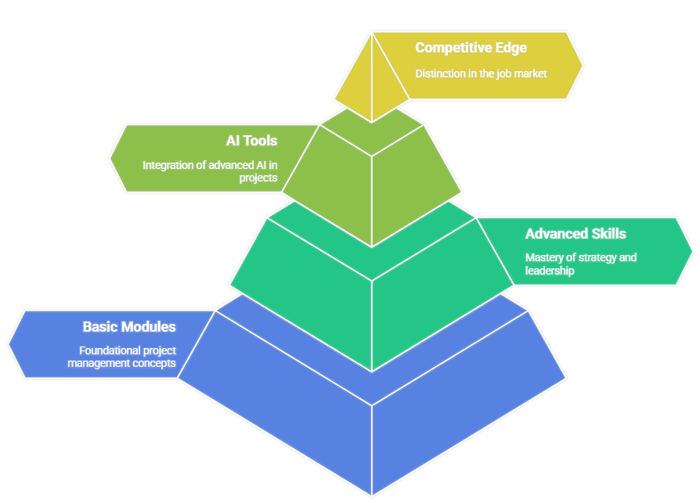
APMIC Certification: A Comprehensive Overview
The APMIC certification stands out as one of the most comprehensive programs available, covering over 400 modules. It's designed for professionals aiming to master advanced aspects of project management, including strategy development, team leadership, and cutting-edge AI tools. This certification is perfect for those seeking a competitive edge in today's job market.
Less Commonly Known Facts About Project Management Books
Project Management Books as Novels: Some project management books are written in a novel style, such as "The Phoenix Project," which follows an IT manager navigating project management challenges, making complex concepts more engaging and accessible. (Reference)
PMBOK Guide Evolution: The PMBOK Guide, a foundational project management text, has evolved significantly. Its seventh edition is more concise and focused on principles rather than processes, reflecting changes in the field. (Reference)
Unofficial Project Managers: Many employees manage projects without formal training. Books like "Project Management for the Unofficial Project Manager" cater to this group, providing practical insights for those who manage projects informally. (Reference)
Agile Misconceptions: Books like "Doing Agile Right" highlight common misconceptions about agile methodologies, emphasizing that agile isn't suitable for every project and requires careful implementation.
Global Project Management Salaries: Project management salaries vary globally, with Australia offering the highest average salary for project managers, according to the Project Management Institute.
Project Success Factors: Clear goals, senior management support, and effective leadership are among the top factors contributing to project success, as highlighted by the Goal Group. (Reference)
Remote Collaboration Benefits: Contrary to myths, remote collaboration can increase productivity by 13%, making it a viable option for project teams.
Certification Rates: Only about 56% of project management specialists at IBM hold a certification, indicating that while certifications are valuable, they are not universal.
Communication Time: Project managers spend about 90% of their time communicating, highlighting the importance of strong communication skills in project management. (Reference)
Conclusion
Investing in project management certification books is one of the smartest moves you can make if you're serious about career growth. Whether you're preparing for the PMP, PRINCE2, or the all-encompassing APMIC, these books provide the necessary insights and confidence to excel. For those looking to boost their career with a top-notch PMP certification prep course, visit APMIC to explore the best resources available.
FAQs
Which certification book is best for beginners?
Head First PMP" by Jennifer Greene and Andrew Stellman is highly recommended for beginners due to its engaging and visual approach.
How do I know if a book is worth buying?
Always check if the book aligns with your desired certification and read reviews from other learners.
Where can I buy these books?
Most books are available on platforms like Amazon or directly from the publishers' websites.
How long does it take to prepare for a certification using books?
Preparation time varies based on experience and study hours, typically taking 6-12 weeks with consistent effort.
Why should I consider the APMIC certification?
APMIC offers a comprehensive program covering over 400 modules, ideal for those seeking advanced project management skills.
What are the benefits of using certification books?
They provide exam confidence, holistic learning, and flexible learning pace.
How do I stay updated with industry trends?
Supplement books with online resources and join professional networks to stay current.
Can I use these books for other certifications?
While some books are specific to certain certifications, many provide general project management knowledge applicable across various certifications.



